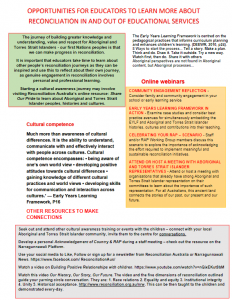11 Learning more about Reconciliation
Megan Higgs
Instructions
This resource is for educators to build or start their journey about Reconciliation and use tools such as the Early Years Learning Framework (DEEWR, 2009) and the 8 ways Aboriginal pedagogy framework that is expressed as eight interconnected pedagogies (Yunkaporta, 2012). These pedagogies involve narrative-driven learning, visualised learning processes, hands-on/reflective techniques, use of symbols/metaphors, land-based learning, indirect/synergistic logic, modelled/scaffolded genre mastery, and connectedness to community that are used to teach children. There are on-line webinars that support educators on a professional level. There are also a few examples of how educators can start and continue the connections, not only between themselves but with others. For example, there are many web sites and YouTube videos. In addition, Narragunnawali Reconciliation offers Professional Development opportunities online and curriculum resources to help with planning and practices with children. They also have newsletters that have current information about events or topics that would be useful in one’s Reconciliation journey.
Rationale
The resource supports educators to have the opportunity to learn about reconciliation by using a variety of tools, such as videos, web sites or through undertaking professional development through on-line webinars. It is suited for individuals or a whole service to assist their journey. Reconciliation involves all educators, children and families along with communities working together, making connections and building partnerships of understanding. The program from Narragunnawali supports early learning settings in developing environments that foster a higher level of knowledge and pride in Aboriginal and Torres Strait Islander Histories, cultures and contributions. (Early Childhood Australia, 2018). Narragunnawali highlights how educators might embed a commitment to reconciliation within their practice. By having these tools, educators can understand the purpose and meaning of Reconciliation, which is about building and maintaining a relationship of trust, unity and respect between Aboriginal and Torres Strait Islander peoples and the broader Australian community. (Early Childhood Australia, 2018). Educators can choose their own path of their journey through own personal and professional growth and their own reflections or through conversation with families and the community either way, starting a reconciliation journey is accepting the past injustices; promoting respecting for Aboriginal and Torres Strait Islander peoples, languages, cultures and heritage; and actively working to ensure justice and equity for all Australians (Early Childhood Australia, 2018).
This program can be used at any time allowing maximum flexibility for managers and educators alike. It can also be used with groups of people, for example, in staff meetings where everyone can participate in reflecting on their reconciliation journey.
Links
The resource documents align with the National Quality Standards: Quality Area 6- Collaboration partnership with families.
The relationships to the EYLF learning outcomes and the Queensland Kindergarten Guidelines are – Early Years Framework: Outcome 1- Children have a strong sense of Identity and Outcome 2- Children are connected with and contribute to their world and QKLG – Identity and Connectedness.


